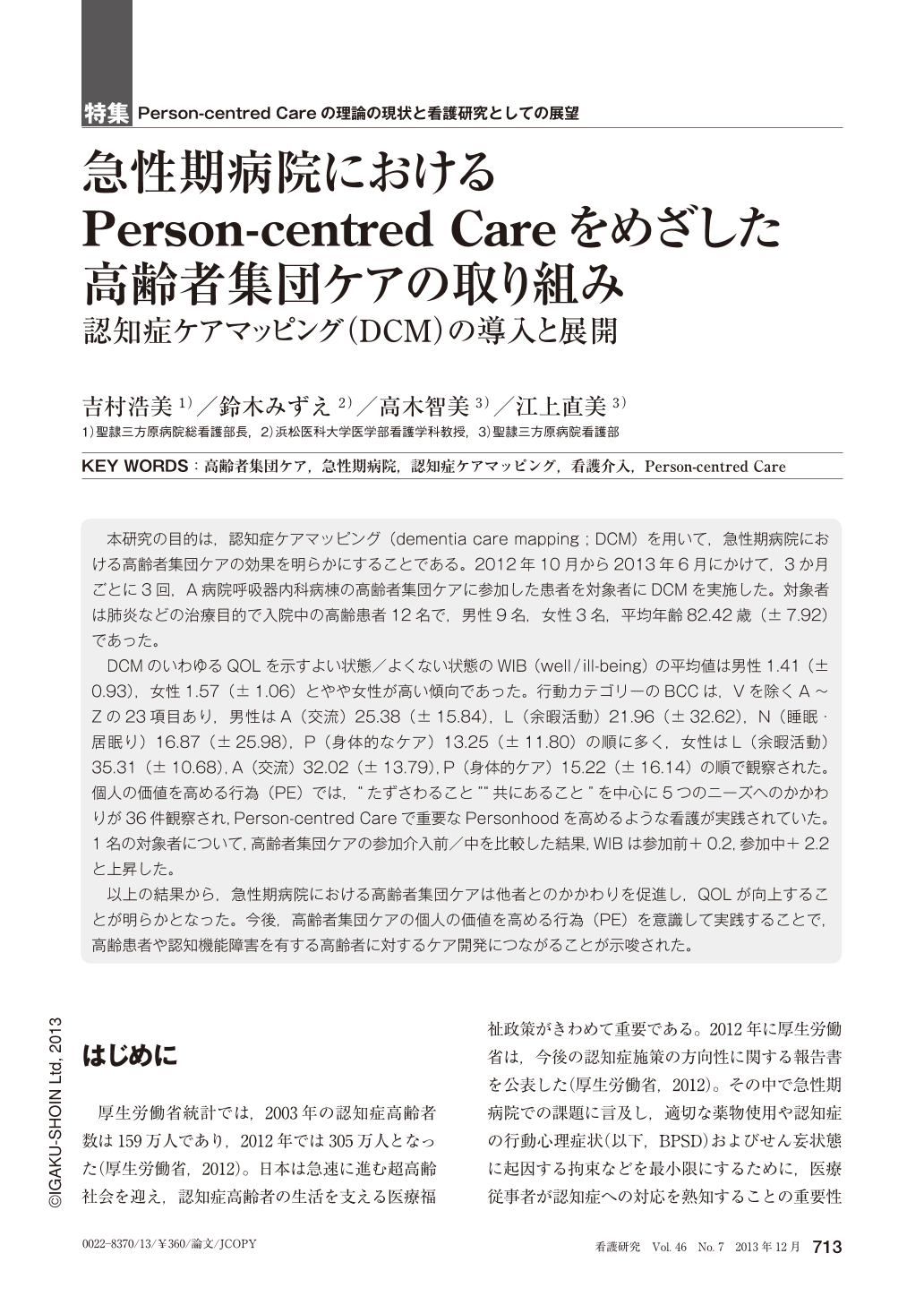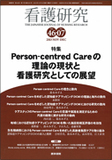Japanese
English
- 有料閲覧
- Abstract 文献概要
- 1ページ目 Look Inside
- 参考文献 Reference
- サイト内被引用 Cited by
本研究の目的は,認知症ケアマッピング(dementia care mapping ; DCM)を用いて,急性期病院における高齢者集団ケアの効果を明らかにすることである。2012年10月から2013年6月にかけて,3か月ごとに3回,A病院呼吸器内科病棟の高齢者集団ケアに参加した患者を対象者にDCMを実施した。対象者は肺炎などの治療目的で入院中の高齢患者12名で,男性9名,女性3名,平均年齢82.42歳(±7.92)であった。
DCMのいわゆるQOLを示すよい状態/よくない状態のWIB(well/ill-being)の平均値は男性1.41(±0.93),女性1.57(±1.06)とやや女性が高い傾向であった。行動カテゴリーのBCCは,Vを除くA~Zの23項目あり,男性はA(交流)25.38(±15.84),L(余暇活動)21.96(±32.62),N(睡眠・居眠り)16.87(±25.98),P(身体的なケア)13.25(±11.80)の順に多く,女性はL(余暇活動)35.31(±10.68),A(交流)32.02(±13.79),P(身体的ケア)15.22(±16.14)の順で観察された。個人の価値を高める行為(PE)では,“たずさわること”“共にあること”を中心に5つのニーズへのかかわりが36件観察され,Person-centred Careで重要なPersonhoodを高めるような看護が実践されていた。1名の対象者について,高齢者集団ケアの参加介入前/中を比較した結果,WIBは参加前+0.2,参加中+2.2と上昇した。
以上の結果から,急性期病院における高齢者集団ケアは他者とのかかわりを促進し,QOLが向上することが明らかとなった。今後,高齢者集団ケアの個人の価値を高める行為(PE)を意識して実践することで,高齢患者や認知機能障害を有する高齢者に対するケア開発につながることが示唆された。
The purpose of this study is to determine the efficacy of Geriatric Group Care at an acute care hospital by utilizing Dementia Care Mapping (DCM). DCM was utilized three times, every three months, between October 2012 and June 2013 for patients who received Geriatric Group Care at a Pulmonary Medicine Unit in Hospital A. 12 elderly patients (9 males and 3 females),who received care based on DCM three times during this study period, were enrolled in this study. The average age of the study participants was 82.42 (±7.92). They were hospitalized to receive medical treatment for a physical disease, such as pneumonia. The average Well and Ill-Being (WIB) value, which indicates the quality of life of the subjects, was slightly higher among females (1.57±1.06) as compared to males (1.41±0.93). With regards to Behavior category codes among males, Articulation (A : 25.38 ±15.84),Leisure (L : 21.96±32.62) and Physical (P : 13.2±11.80) showed higher scores. Among females, the order was L (35.31±10.68),A (32.02±13.79) and P (15.22±16.14). In terms of Personal Enhancer (PE),36 cases involved five needs which were observed, including “occupation” and “inclusion”. This showed that nursing practices that enhance personhood, which is important in person-centered care, was being provided. When WIB value was compared for one subject before and during reception of Geriatric Group Care, the value was increased from before (+0.2) to during receiving the care (+2.2). Based on this result, we’ve found that Geriatric Group Care at an acute care hospital could improve their quality of life by promoting relationships with others. It is suggested that the development of care for elderly patients or elderly people with cognitive impairment could be improved by considering PE in Geriatric Group Care hereafter.

Copyright © 2013, Igaku-Shoin Ltd. All rights reserved.


